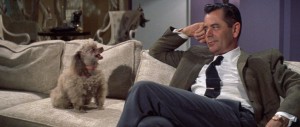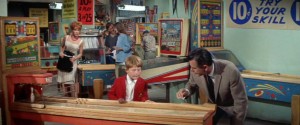I haven’t a clue what the title means, but this kinky and mainly sweet-tempered heist film (2001) by Australian writer-director Scott Roberts seems fairly fresh to me, despite its heavy-handed way with a few generic staples (e.g., a femme fatale played by Rachel Griffiths). A scuzzy lawyer (Robert Taylor) enlists three goofy and basically nonviolent bank-robbing brothers (Guy Pearce, Damien Richardson, and Joel Edgerton) to pull off a job at a Melbourne racetrack, but many misadventures ensue. At times the plot developments in this post-Tarantino story seem so random they suggest automatic writing, but the characters and some of the settings kept me interested. 102 min. (JR) Read more
From the Chicago Reader (June 20, 2003). — J.R.
Desperate to get over his writing block so he can finish a novel, collect $125,000 from a publisher (director Rob Reiner), and pay off gambling debts to violent Cuban loan sharks, a young author (Luke Wilson) hires a stenographer (Kate Hudson) who helps him along with her strong opinions. The novel, set in 1924, follows the romantic adventures of an aspiring novelist (Wilson again) working for a French family as an English tutor and romancing first the children’s mother (Sophie Marceau) and in later versions her au pair (Hudson again), a character whose nationality keeps changing as the story is revised. The actors make this fun if you can overlook the ludicrous view of Jeremy Leven’s screenplay concerning how novels are written and what publishers generally pay for them — the true subject is writing silly Hollywood scripts like this one. 100 min. (JR)
Read more
The issue isn’t only whether we can accept Bob Cummings as an anthropologist studying teenagers but whether he can accept Frankie Avalon and Annette Funicello as likely specimens. Dorothy Malone is also on hand, and Harvey Lembeck offers a parody of Brando’s biker persona. William Asher directed this 1963 feature. 101 min. (JR) Read more
Coproduced by Mingus’s fourth and last wife Sue (who more recently published the memoir Tonight at Noon: A Love Story), this 1997 video documentary by Don McGlynn crams in as much as possible about the life and music of the jazz bassist, composer, and bandleader. In many ways this is a losing proposition, because Mingus’s greatness had a lot to do with his resistance to being commodified, synopsized, excerpted, or even categorized. Furthermore, the triumph of the title seems to refer more to the posthumous performance of Mingus’s magnum opus, Epitaph, conducted by Gunther Schuller, than to his actual life. But the sheer gusto of his volatile personality eventually comes across, and the music’s passionate emotion survives even in the fragments presented here. 78 min. (JR) Read more
From the Chicago Reader (June 20, 2003). — J.R.

Before it became a TV series, this cutesy comedy by Vincente Minnelli had some status as an auteurist favorite, but it’s a long way from Minnelli’s Father of the Bride (another proto-sitcom). Ron Howard, known in 1963 as Ronny, tries to find a new wife for his widower dad (Glenn Ford); with Shirley Jones, Stella Stevens, and Dina Merrill. Filmed in Panavision. 117 min. (JR)
 Read more
Read more
It’s been almost a year since Rolf de Heer’s 2002 western was screened as the opening-night attraction at the Melbourne film festival, but it’s lodged in my memory as the best Australian feature I’ve seen in years. Aboriginal actor David Gulpilil (Walkabout, Rabbit-Proof Fence) gives the performance of a lifetime as a tracker helping three mounted police find a murder suspect in 1922, and though the film recalls Jim Jarmusch’s Dead Man in its grim tale of pursuit, its poetic feeling for both history and landscape, and its contemporary score (by aboriginal singer-songwriter Archie Roach), it has an identity all its own. (One of its most original moves is cutting to paintings by Peter Coad, specially commissioned for the film, at every moment of violence.) The film’s U.S. distributor, hoping for a wider release in Chicago, hasn’t screened it for the local press, which is why I’m not writing about it at length. But it may never return, so catch it while you have the chance. With Gary Sweet and Grant Page. 102 min. Facets Cinematheque. Read more
I’d be pushing it to call this buddy comedy/cop thriller a souffleit’s hardly that subtlebut movies don’t get much lighter than this. Harrison Ford and Josh Hartnett star as LAPD detectives investigating the murder of a rap group, a perfunctory adventure that allows writer-director Ron Shelton (Bull Durham, Tin Cup) and cowriter Robert Souza (a former LAPD detective himself) to dispense a lot of cheerful satire about such foolishness as police corruption (which is taken for granted throughout) and Angelenos’ obsessions with acting, real estate, and New Age calisthenics. This is basically about the heroes’ personalities (the producers seem to be hoping for a franchise like Beverly Hills Cop or Lethal Weapon), and though its ending feels protractedespecially the climactic chaseit kept me reasonably distracted. The backup cast includes Lena Olin, Keith David, Martin Landau, and Shelton regular (and wife) Lolita Davidovich. 111 min. (JR) Read more
I can’t say I got much pleasure from this gross-out horror tale by writer-director Lucky McKee, about a friendless young woman who sews stitches at an animal hospital, but by the final credits I was able to grant it a certain scuzzy conceptual integrity (even if the ending challenges some of the premises the movie has halfheartedly adopted). Angela Bettis is interesting in the title role, though the script requires her to oscillate between extreme awkwardness and cool composurenot to develop her character but to set up a few grisly shocks. More generally McKee’s direction of actors is as clumsy as the stabs at rapid editing. With Jeremy Sisto and Anna Faris. 95 min. (JR) Read more
Powerful and haunting, this upsetting documentary by Andrew Jarecki examines the scandals enveloping an upper-middle-class Jewish family in suburban Long Island, as the father and a teenage son are accused of sexually abusing countless boys. The story unfolds over many years, with as many carefully delayed revelations as in a well-plotted fiction film, and though Jarecki raises a good many questions about the Friedmans that he doesn’t entirely resolve, his exploration of the larger issues–police investigations, community hysteria, and the family members’ obsession with filming themselves–is much more revealing. 107 min. Landmark’s Century Centre. Read more
The third installment sequentially (1997) of writer-director Matthew Barney’s Cremaster cycle is just as lethargic and self-satisfied as the others I’ve seen, though less monotonous rhythmically. An opera set in late-19th-century Budapest, with extended portions of the action taking place underwater, it stars Ursula Andress in the only singing role (though her voice is dubbed by Adrienne Csengery) and Barney in three parts that seem to sum up his self-image (Diva, Magician, Giant). This avant-garde pageant is characteristically mythoprosaic (to coin a term), though it does make the most of its Hungarian locations. If it were less doggedly florid and had any sort of humorcamp or otherwiseit might qualify as a big-budget remake of an early Werner Schroeter opus. The music is by Jonathan Bepler. 55 min. (JR) Read more
With or without a comprehensible story, crosscutting is one of the least interesting forms of editing, and Matthew Barney addresses the problem much as Robert Altman does when he’s on autopilotby pretending it doesn’t exist. This lumbering avant-garde spectacular (1994) stars Barney as the Loughton Candidate, a tap dancing and crawling satyr juxtaposed with two motorcycle teams racing across the Isle of Man. The film invites us to consider the multiple meanings of its elaborate surrealist imagerymuch of it viewed from Barney’s favorite camera position, the celestial overhead shotbut all I could think about was hype and money. The colors are characteristically lurid. 42 min. (JR) Read more
Sculptor, writer-director, and former football player Matthew Barney returns to Bronco Stadium in his hometown of Boise, Idaho, to stage a Busby Berkeley-style dance routine while two Goodyear blimps float overhead. Inside each blimp are four air hostesses and an elaborately set banquet table, and under each table lies a winsome figure known as Goodyear (Marti Domination), whose idly created configurations of green or purple grapes are duplicated by the dancing girls below. This slick spectacle (1995), packed with metaphors relating to procreative biology, tries very hard to impress us with its production values, but I was bored by its programmatic literalism and mechanical crosscutting. 41 min. (JR) Read more
An arch Jewish-lesbian comedy without laughs (2001), made outside the usual American independent circuits, this is largely the work of writer-director-star Helen Lesnick, who models her persona on Woody Allen (and even includes a couple of references to him in the dialogue, in case we’ve missed the point). After splitting up with her girlfriend in New York (Michele Greene), she visits her gay-sensitive parents in San Diego and hits it off with a California WASP (Erica Shaffer); a Jewish wedding between the two is threatened by Greene’s reappearance. The couple’s parents have a bit more personality than the other characters, but on the whole this is strictly by the numbers. 100 min. (JR) Read more
Eight years in the making, this haunting and highly watchable 35-millimeter experimental feature by Pat O’Neill (2002, 73 min.) is partly a color documentary on the ruins of Hollywood’s Ambassador Hotel (site of the first Oscar ceremony as well as the Robert Kennedy assassination) and partly a speculative patchwork of its decaying fictions. Working with sound designer George Lockwood and a team of 45 actors, O’Neill has superimposed transparent characters and props over the settings and added dialogue, music, and sound effects from black-and-white Hollywood features. A special-effects wizard whose day job is working on Hollywood blockbusters, O’Neill showed in his 1989 Water and Power a poetic feeling for human evanescence in relation to southern California locales; here he proves equally astute at showing how our sense of history becomes tainted by and entangled with Hollywood myths. (JR) Read more
Frederick Wiseman’s first fiction film (2002), a one-woman performance by the Comedie Francaise’s skillful and expressive Catherine Samie, is so well made that I can only feel guilty for not liking it more. Its text is taken from a Russian novel by Vasili Grossman; in it the author tries to imagine a letter written to him by his mother, a Jewish doctor in a German-occupied Ukrainian city, shortly before her extermination. The text is vivid and powerful and the performance riveting, although the fancy configurations of expressionist shadow Wiseman employs throughout this black-and-white film suggest that he felt the package needed something more. It does: a little more breathing room for the viewer. In French with subtitles. 61 min. (JR) Read more



